Some shows, like Parks and Recreation and Game of Thrones, remind me of summer storms. You know exactly what you’re in for as soon as you see the first gray clouds: First it’ll become overcast, then rainy, then windy, then you’ll get a few minutes of heavy thunder and lightning, then a pleasant post-precipitation humidity as the front passes.
I have nothing against these shows whatsoever. In fact, I love plenty of them. They’re reliably well-crafted. They’re carefully measured, intelligent and consistent, with a distinct flavor. But they have their rhythms.
That’s one type of great television. Then there’s Community.
Community is like one of those weird fall thunderstorms where the sky turns a funky color (green or purple or orange) and you don’t know what to expect. Anything could happen. Sometimes it’s like a hurricane, and you’re totally awe-inspired — maybe even terrified. Other times, it just drizzles — a waste of the ominous feeling — and you’re left wondering “that’s it?” But, no matter what happens, the result is a bit inexplicable and unpredictable.
That’s what it was like being a Community fan. One week you’d finish an episode and be in shock at the amount of comedy and emotion and creativity packed into a half hour (“Modern Warfare”). The next you’d roll your eyes at how uninspired and unfunny an episode was (“Celebrity Pharmacology”). And the next, you’d scratch your head at a formal experiment wondering what the hell you just watched (“Basic Story”).
But Community is more to me than an inconsistently brilliant show. It’s something I feel truly connected to. It’s one of only five shows to ever hold the crown of “my #1 favorite currently running show” — the others being Parks and Rec, Game of Thrones (the current title-holder), and two shows yet to come this countdown.
That is: If every active show decided to air a new episode at the same time, what show would I watch? There are only five shows I would have ever responded with, and Community is one of those five.
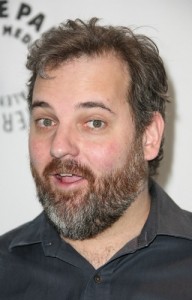 It was the type of show I needed in 2009: It played with the sitcom formula in some interesting ways without ever becoming a mere parody (though parody is what it became famous for). Its experimental nature drew me in, and it’s warmth kept me coming back.
It was the type of show I needed in 2009: It played with the sitcom formula in some interesting ways without ever becoming a mere parody (though parody is what it became famous for). Its experimental nature drew me in, and it’s warmth kept me coming back.
Among the most interesting things about Community is that it is staff-written but has the feeling of “auteur TV” as one very distinct voice shines through: That of creator Dan Harmon, a hilarious, insanely smart, dark-humored, and volatile personality.
Let’s quickly walk through the show’s five seasons and trace Community’s arc:
Season 1
When I heard two actors I like, Donald Glover (I chronicled my longtime fandom of Glover when I recapped his final episode at Character Grades) and Yvette Nicole Brown (of Drake and Josh), were cast in a new comedy for NBC, I knew I had to give it a try.
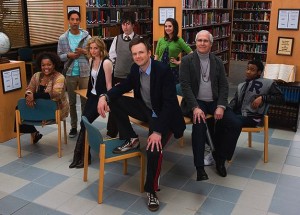 And I loved it from the pilot. There’s a long-standing myth that Community had a bad start, like The Office or Parks and Rec. It may not have been instant dynamite like Cheers or Arrested D, but it had no more growing pains than any sitcom does as it figured out its characters.
And I loved it from the pilot. There’s a long-standing myth that Community had a bad start, like The Office or Parks and Rec. It may not have been instant dynamite like Cheers or Arrested D, but it had no more growing pains than any sitcom does as it figured out its characters.
The show centers on seven people attending community college who form a Spanish study group in the pilot. But, as protagonist Jeff proclaims in his first fantastic monologue, they’re more than just a study group… they’re a “community” of people.
Thus began a show that not only explored seven completely different people, but also considered the way that “communities” function. It also, very quickly, became a show about the rhythms of its own story, intentionally disrupting or commenting on those rhythms.
While there were a few early clunkers (“Advanced Criminal Law” is one of the show’s bottom five episodes), the show undeniably hit greatness about a third of the way into the first season with “Debate 109,” the ninth episode and the first in which Alison Brie and Joel McHale get to have great chemistry together. That began a strong stretch for the show.
![]()
![]()
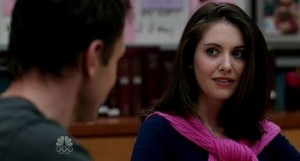 (Speaking of “Debate 109,” Todd VanDerWerff wrote one of the most creepy/fantastic tributes to Alison Brie ever in his recap of the episode. And speaking of Todd VanDerWerff, his reviews of Community episodes are absolutely essential reading, especially if you’re watching the show for the first time. Great tribute to the show.)
(Speaking of “Debate 109,” Todd VanDerWerff wrote one of the most creepy/fantastic tributes to Alison Brie ever in his recap of the episode. And speaking of Todd VanDerWerff, his reviews of Community episodes are absolutely essential reading, especially if you’re watching the show for the first time. Great tribute to the show.)
“Environmental Science” has one of my favorite scenes the show ever did — an elaborate montage set to Troy and Abed singing “Somewhere Out There” from An American Tail — and “Comparative Religion” managed to be about religion in a non-infuriating way. (The latter also features the line “knock knock, my fist up your balls.”)
The first half of the season was good. But after the halfway point, pretty much every episode was classic (except maybe the “schmitty!” episode, “Art of Discourse”). Some favorites from this stretch:
“Physical Education,” in which Abed tries to get a date and Jeff plays pool, is one of my favorite episodes in the series, a hilarious and gonzo spoof of the homoeroticism of sports movies.
“Contemporary American Poultry” managed to spoof Goodfellas and Sixteen Candles at once.
“English as a Second Language,” the penultimate episode of the first season, ended the school year on a warm note, laying groundwork for a climactic, somewhat unexpected kiss in “Pascal’s Triangle Revisited,” the finale.
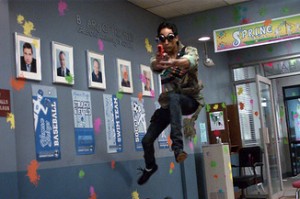 The best episode of the season — and the entire series, as far as I’m concerned — is the epic, brilliant “Modern Warfare.” The show perfectly captures the climactic feeling of apocalyptic action movies, but makes it work in the context of Community. If you haven’t seen this episode, you really should — it stands on its own well enough. (The spot-on Die Hard references bring it up a few notches in my book, too.)
The best episode of the season — and the entire series, as far as I’m concerned — is the epic, brilliant “Modern Warfare.” The show perfectly captures the climactic feeling of apocalyptic action movies, but makes it work in the context of Community. If you haven’t seen this episode, you really should — it stands on its own well enough. (The spot-on Die Hard references bring it up a few notches in my book, too.)
In all, Community’s first season is probably my favorite. It’s the show’s warmest and most romantic season, and the second half of the season is pretty close to faultless.
Season 2
Community built buzz between the show’s two seasons, particularly thanks to the popularity of “Modern Warfare.” Many of my favorite sitcoms have had their sophomore seasons be their best ones (or at least my favorite), thus I had very high expectations for Season 2.
And the result was equal parts success and failure. The second season’s highlights mark the many of the high points of the series. But for every great episode, there was at least one snoozer.
For example, the season’s 18th episode, “Custody Law and Eastern European Diplomacy” features one of the show’s most regrettable stories, as Britta realizes the man she’s dating is a war criminal. If not for a handful of really funny jokes on the fringes, it’d be a candidate for the show’s bottom 5 episodes.
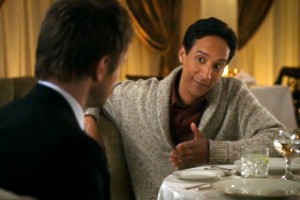 But the season’s 19th episode, “Critical Film Studies,” is a fucking masterpiece of defied expectations centered around a strange, emotional conversation between Jeff and Abed. Its centerpiece is a three-minute monologue by Abed about Cougar Town and pooped pants that is so riveting, you’ll immediately want to rewind it to watch it again.
But the season’s 19th episode, “Critical Film Studies,” is a fucking masterpiece of defied expectations centered around a strange, emotional conversation between Jeff and Abed. Its centerpiece is a three-minute monologue by Abed about Cougar Town and pooped pants that is so riveting, you’ll immediately want to rewind it to watch it again.
Both of these episodes are stories are strange, yes, but former is strange in a bad, tasteless way while the latter is strange in a “I’ve never seen a TV show do this before, but I love it” sort of way.
Other highlights, all of which rank among the show’s best episodes:
“Advanced Dungeons and Dragons” revolves around the characters playing a thrilling game of D&D. “Mixology Certification” depicts the characters going to a bar together and turning into pathetic versions of themselves. “Cooperative Calligraphy” is a bottle episode done right, and “Paradigms of Human Memory” is a fake clip show that implies Community shows the least interesting stories these characters have to tell.
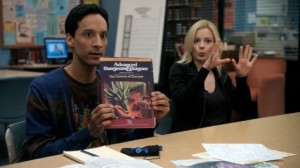 In spite of these highlights, I found myself slightly less in love with the show. It was never more ambitious, so frequently daring and masterful, as that second season. But it lost a bit of the palpable warmth and romance that grounded the first season. And the plots that DID attempt to ground the show, like Shirley’s pregnancy, didn’t work as well as Harmon wanted them to.
In spite of these highlights, I found myself slightly less in love with the show. It was never more ambitious, so frequently daring and masterful, as that second season. But it lost a bit of the palpable warmth and romance that grounded the first season. And the plots that DID attempt to ground the show, like Shirley’s pregnancy, didn’t work as well as Harmon wanted them to.
On the whole, Season 2 is probably Community’s BEST season (despite its inconsistency), but it did not quite connect with me in the same way Season 1 did. Still — some of this stuff was so damn great that it remained, along with Parks and Rec, part of a two-way tie for my favorite show on TV.
Season 3
Many had been hoping that Community’s critical buzz from the second season would lead to improved ratings, but it never happened. By the time Season 3 rolled around, there was a general feeling that this would be Community’s last run.
Dan Harmon didn’t state this assumption explicitly. He hedged it by saying “you never know what your last chance will be” and promised to go out swinging with Season 3. He even did the thing he’d vowed not to do earlier in the show’s run: season-long plotting. Gasp!
The show became even weirder, borrowing structure and cues from the strangest of sources (Apocalypse Now? Ken Burns?). More often, the “weird” went more in the direction of “okayyyy” than “AWESOME,” but it makes for a rich season full of variety and curiosity.
The bulk of the season is strange in moderate ways. There’s an episode simply called “Advanced Gay,” and another that’s a seven-part horror story anthology. The Christmas episode is a musical, and the season’s most prominent recurring plot is a cult-like HVAC trade school trying to recruit Troy, whom they view as a messiah.
But if that stuff seemed weird, the final eight episodes brought it to a whole new level. There’s some truly unbelievable, possibly show-torpedoing, stories in the final stretch of Season 3. It often felt like a misfire at the time, but it’s something I find myself thinking more fondly of as time passes.
Let’s take a quick look at those eight episodes: In “Virtual Systems Analysis,” Annie and Abed basically spend the entire episode acting in front of a green screen, impersonating other characters; “Basic Lupine Urology” is beat-for-beat Law and Order facsimile; “Course Listing Unavailable” deals with a side character abruptly dying and the study group expelled; “Curriculum Unavailable” centers around a psychiatrist trying to convince the study group that Greendale was never a community college but a mental asylum the characters had been admitted to; “Digital Estate Planning” is told almost entirely through a video game; “The First Chang Dynasty” features Chang as a monarch over the school; and “Introduction to Finality” has evil versions of characters from another dimension trying to wreak chaos on Greendale.
It’s a hell of a way to go out, except, of course, the show was miraculously renewed… and Dan Harmon fired. Wow.
Before I wrap up my talk of Season 3, I want to point out the season’s best episode, and one of the show’s best ever: “Remedial Chaos Theory,” whose entire point is to show seven timelines of the characters answering the doorbell to greet the pizza delivery guy. It’s so brilliantly constructed and executed that it almost defies description. It’s clever and fun, but also in touch with the characters. Like “Modern Warfare” from Season 1, it stands on its own well, so I highly recommend you seek it out if you haven’t seen it.
Now… onto the zombie season of Community, where the show ambled on without its soul thanks to the absence of visionary Harmon.
Season 4
I was ready to like it. And I think I tricked myself into enjoying most of it as it aired.
But in the end, Season 4 will go down as a minor travesty, with only small flashes of greatness as opposed to routine episodes full of it.
With Dan Harmon ousted as show runner and two new guys in his place, the show was at a fork in the road: either try and mimic Dan Harmon’s style, or develop a new style without him. By and large, they went with the former, which was definitely the wrong choice.
I was actually hoping for a return to roots of sort, as I missed the average-community-college stories of the show’s first season. By the epic finale of Season 3, those early episodes were a long-lost memory.
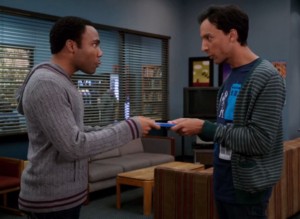 While Season 4 is more buttoned down than the most extreme moments of previous, the show tries to have the same versatility and intense voice of previous seasons, and almost every episode feels full of jokes and stories that didn’t quite make it.
While Season 4 is more buttoned down than the most extreme moments of previous, the show tries to have the same versatility and intense voice of previous seasons, and almost every episode feels full of jokes and stories that didn’t quite make it.
Among the highlights are “Basic Human Anatomy” where Troy and Abed re-enact a Freaky Friday body switch, while “Herstory of Dance” fits the mold of what I imagined this season trying to do: Tell ordinary stories respectably well.
The lowlights? Yuck. There are a lot. “Intro to Felt Surrogacy” feels like a bad spec script, “Heroic Origins” retcons the group’s origin story, revealing (quite stupidly, in my opinion) that the characters were linked in many ways before they ever met.
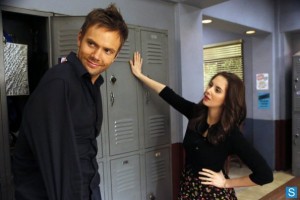 But the most disappointing episode of Community will forever be “Advanced Introduction to Finality,” the episode everyone assumed, again, would be the show’s last ever. Jeff, totally out of character, is sucked into a fantasy of evil versions of the characters. Along with rehashing the previous season finale, the execution is just not very good or funny or endearing. It would have been a very sour way for the show to go out.
But the most disappointing episode of Community will forever be “Advanced Introduction to Finality,” the episode everyone assumed, again, would be the show’s last ever. Jeff, totally out of character, is sucked into a fantasy of evil versions of the characters. Along with rehashing the previous season finale, the execution is just not very good or funny or endearing. It would have been a very sour way for the show to go out.
It wasn’t just that the episodes weren’t entertaining, but that the character development was haphazardly crapped out. Community had previously been so good at making character growth and big moments feel “earned” with a deliberate pace and consideration of each bit of change. Not Season 4: Jeff finally met his dad. Abed finally got a girlfriend. Troy and Britta finally dated. And none of it was interesting.
Here’s what I wrote for Character Grades after the season finale:
Part of me wants NBC to bring Community behind the shed and put it out of its misery like a sick pet. Another part of me wants to Community to come back just so it has another chance to go out with a roar – or at least a pleasant purr – instead of last night’s strangled whimper.
Then the inexplicable happened, the only thing that could make me truly excited for the show to come back: The prodigal son returned. Dan Harmon was miraculously rehired to make a shortened fifth season of the show. This was basically the only thing the show could have done to rejuvenate my interest in Community, as I was starting to grow tired of this cheap knockoff version of one of my favorite shows.
Season 5
Dan Harmon returned, and with his return came an immediate return to quality.
In fact, I remember claiming halfway through the fifth season that it was on pace to be the show’s best season, episode-for-episode.
Jeff, who graduated in the finale of Season 4, returns to Greendale as a teacher after his new law firm fails, and the rest of the study group (minus Pierce) re-enrolls following disappointing post-college careers.
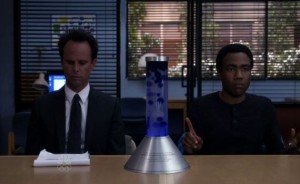 The first five episodes are probably each better than every episode of Season 4. Or, at a minimum, they each felt more like “Community” than anything from Season 4. My favorite episode of the season is probably “Cooperative Polygraphy,” in which the group comes to terms with the passing of Pierce.
The first five episodes are probably each better than every episode of Season 4. Or, at a minimum, they each felt more like “Community” than anything from Season 4. My favorite episode of the season is probably “Cooperative Polygraphy,” in which the group comes to terms with the passing of Pierce.
The other candidate for best of the season would be “Geothermal Escapism,” an episode that takes the apocalyptic paintball feeling from “Modern Warfare” and gives it a fresh spin through The Floor is Lava. And it ends on an emotional note as Troy says goodbye to the study group.
The second half of the season is not quite so bulletproof; Harmon indulges in some of his bizarre impulses once again, with mixed results. The new D&D episode makes good use of David Cross but is a definite step down from the original, while “App Development and Condiments” is completely wacky in an admirable way. “GI Jeff” is perhaps the show’s most obscure “concept episode” of its entire run.
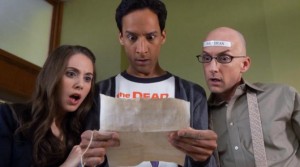 It went out on a two-parter that started intriguing but then fell flat. “Basic Story” is an all-time sitcom oddity, even by the standards of this show: It has its characters trying to convince themselves that they’re not living part of a story, and the framing of the story is adjusted accordingly. (It’s hard to explain.) I really loved it, actually. It felt fresh and appropriate for the show and got me excited for a balls-to-the-walls strange ending.
It went out on a two-parter that started intriguing but then fell flat. “Basic Story” is an all-time sitcom oddity, even by the standards of this show: It has its characters trying to convince themselves that they’re not living part of a story, and the framing of the story is adjusted accordingly. (It’s hard to explain.) I really loved it, actually. It felt fresh and appropriate for the show and got me excited for a balls-to-the-walls strange ending.
The second half, “Basic Sandwich,” didn’t live up to that hype. There’s some great stuff on the edges, but the whole episode feels like it was written during a hangover where the writer couldn’t get the premise — guy has been living underground in a computer lab for decades, trying to get the computer to feel emotions — to really click.
All in all, it was a very good season that was a strong bounce back from Season 4. Even if it didn’t feel like a home run in the end, it still was still a WAY better way to go out.
Season 6???
So Community was canceled after Season 5. Oh well.
But there have been recent rumblings that Hulu might pick up the show for a sixth season, which I would totally be in favor of. Part of the reason that a sixth season seems so necessary is because of a throwaway joke from Season 3, where Abed becomes loyal to the failed superhero show The Cape, insisting it will be renewed for “six seasons and a movie.” Thus, #sixseasonsandamovie became the unofficial (and later semi-official) hashtag for Community fans. We NEED our sixth season and our movie.
I also wouldn’t be too overwhelmed with sorrow if the show was canceled for good… I don’t feel a burning need to explore more stories with these characters. But I do feel there is a bit of life yet in the show, and would like to see Dan Harmon craft the ending that he really wants.
In Conclusion
Community is one of my all-time favorite shows. It built a ton of goodwill, then squandered it, then recovered it, and left me somewhat perplexed the whole time. Few shows have ever made me so obsessed for stretches at a time, and few shows have ever given me so much to think about.
But I’ll remember Community most of all not for its strange arc or its thought-provoking nature or even its gut-busting comedy, but for its huge, genuine heart. It took a cynical man (Dan Harmon) with a unique, bristling voice to make a truly moving sitcom portrait of the value of “communities” and human relationships. And, for that, I will forever be a Dan Harmon and Community fan.
![]()


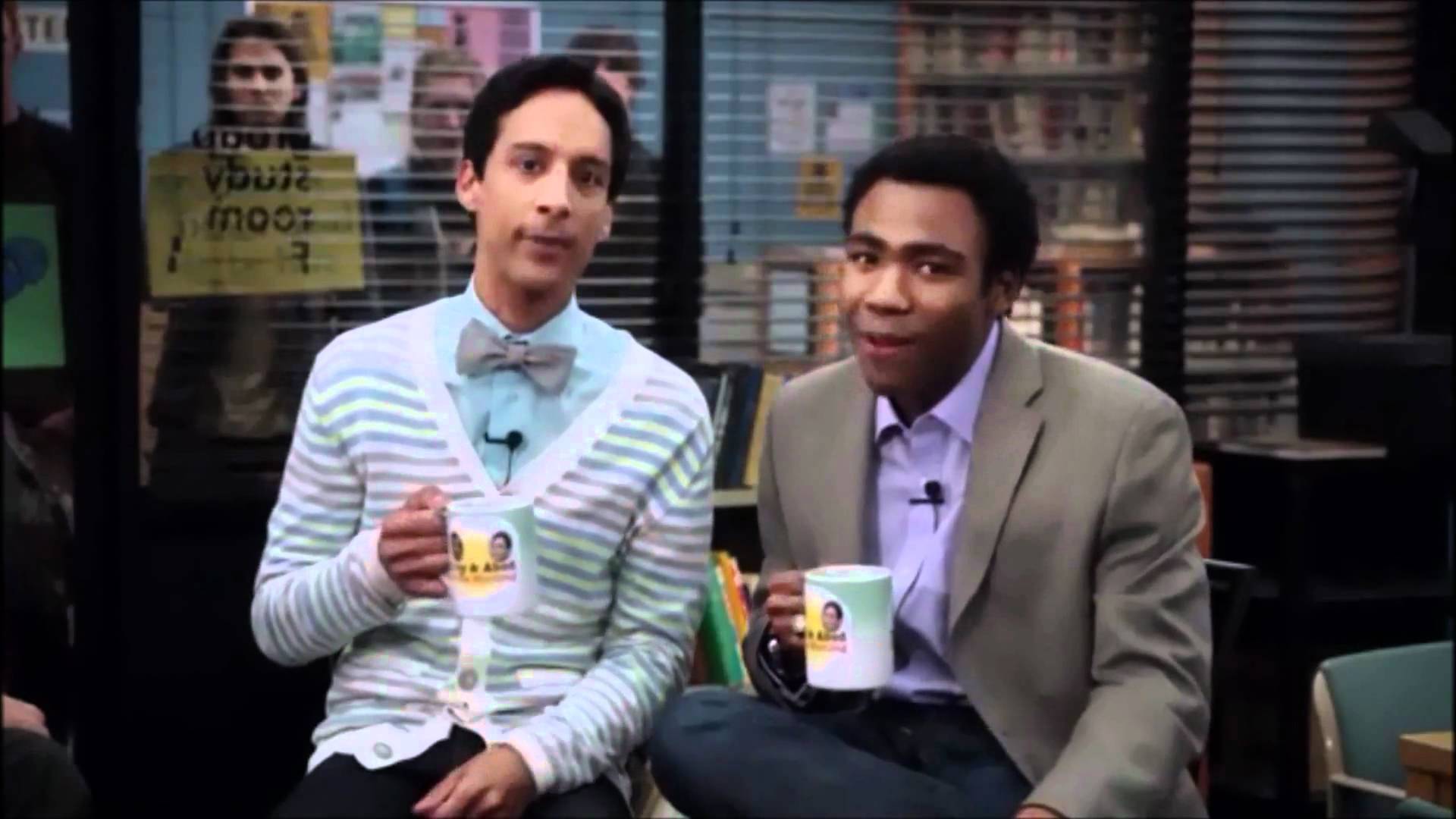
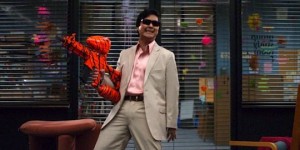
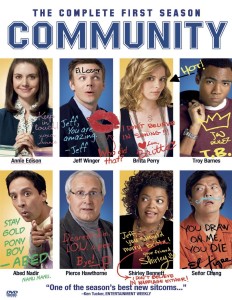
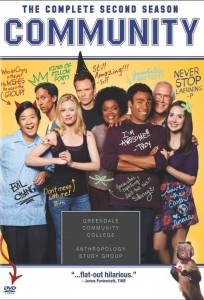
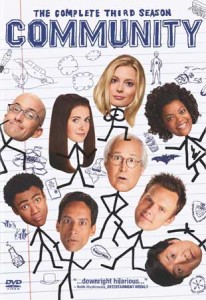
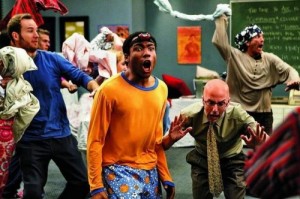
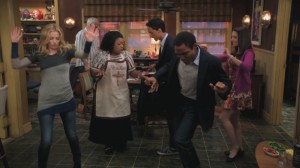
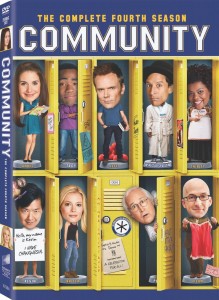
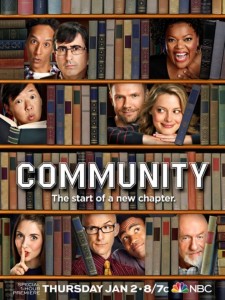
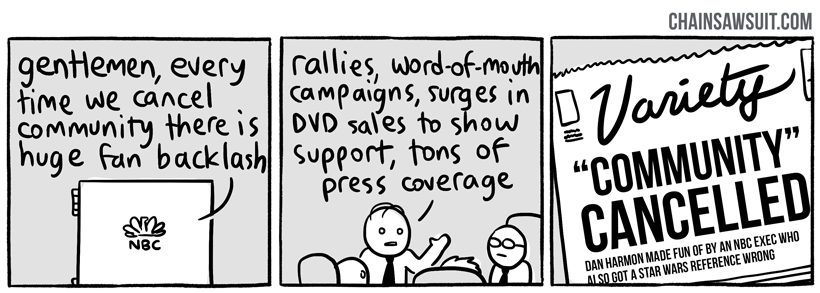
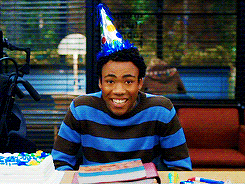



I must admit, I peeked at this post before it went up, and it inspired me to get a Hulu Plus account. To make the most of the 1-week free trial, I’ve been marathoning Community. Over the last four days, I’ve watched the first three seasons. What I’ve seen so far has been pretty fantastic (Abed is easily one of my favorite TV characters of all time). Also, I realized that the only episode I saw in the show’s original run was the Season 3 finale…quite possibly the weirdest episode to come in on. Evil twins, holodeck, A/C secret society, references to three seasons-worth of absurdity. It feels good to finally understand things.